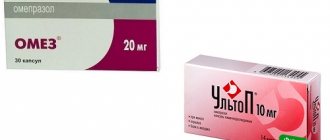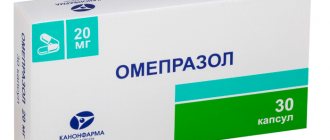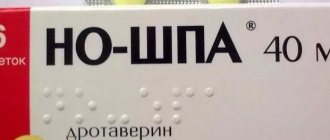When your stomach hurts and there is heartburn, you want to quickly take an effective medicine.
But how to take Omeprazole to restore gastrointestinal and intestinal function, who is indicated and contraindicated, what side effects does it have and can it be replaced with other analogues? It's worth looking at in more detail.
Release form, composition and packaging
Omeprazole is a fairly well-known drug.
Produced by many Russian companies under the following brands:
- Akrikhin;
- teva;
- Avva rus;
- astrapharm;
- Sandoz;
- Richter;
- promed;
- shtad.
The medicine affects the enzyme in the stomach as part of hydrochloric acid, suppresses secretion, accelerates the exchange of hydrogen ions in the mucus of the epithelium, thereby blocking the production of hydrochloric acid products.
As a result, the level and secretion of digestive juice decreases.
Taking into account the doses taken, the effectiveness of the drug is observed within 1-1.5 days.
The release form of the medicine is hard capsules (10, 20, 40 mg). Packaging – cellular, contour. Pack - cardboard or polymer cans (10, 20 mg).
Contains:
- active ingredient – Omeprazole;
- auxiliary elements: sodium lauryl sulfate, purified water, dye E129, glycerin, gelatin, nipagin, mannitol, sugar, titanium dioxide, talc, methacrylic acid.
Pharmacological action, pharmacokinetics
Omeprazole has an inhibitory and antiulcer effect, inhibits the activity of the enzyme adenosine triphosphate H + K.
When the metabolite enters an acidic environment, after 4-5 minutes it begins to transform into sulfenamide, actively interacting with phosphates, blocking the phase.
This drug is a highly selective drug for conversion into an active metabolite in an acidic environment.
In relation to parietal cells, the drug is not absorbed, but quickly suppresses the secretion of hydrochloric acid irritants and the production of pepsin, leading to a decrease in the total volume of contents in the stomach.
Omeprazole in capsules with a thin shell contains microgranules, the release of which within 1 hour after use leads to the achievement of maximum therapeutic effect. Storage lasts up to 1 day.
A single use of Omeprazole is sufficient to suppress the secretion of hydrochloric acid to the maximum for the whole day. Secretory activity will be restored after 5-6 days if you stop taking Omeprazole.
The pharmacokinetics of the drug is as follows:
- bioavailability - 40%, but may increase in older people;
- absorption – high;
- lipophilicity - high at the time of interaction with albumin and glycoproteins (proteins) in the blood plasma;
- the elimination period is 0.5 hours and a little more than 3 hours for liver diseases.
Metabolism occurs in liver cells in the form of 6 inactive metabolites. Up to 80% of the drug is excreted by the kidneys, and up to 40% by bile. The rate of elimination of the drug may be reduced in elderly people with chronic renal failure.
How to take Omeprazole for gastritis
When taking the standard dose recommended in the instructions - 20 mg, after 1 hour a pronounced antisecretory effect appears, stomach pain is reduced and other unpleasant symptoms of gastritis disappear. The maximum effectiveness of the drug occurs 2 hours after administration and for another 24 hours after taking a single therapeutic dose; omeprazole blocks up to 50% of synthesized hydrochloric acid.
The use of omeprazole for gastritis must be approved by the attending physician. Despite the safety and effectiveness of the drug, only a qualified specialist will be able to assess the appropriateness of its prescription, indicate the exact doses, mode of administration and duration of the course of administration. To treat gastritis, use tablets or capsules, swallowing them whole, without chewing, and drinking a small amount of water.
It should be taken at least an hour before meals. It is better to do this in the morning before breakfast. The usual dosage of the drug for the treatment of gastritis is 1 capsule or tablet per day, which corresponds to 20 mg of omeprazole. If this dose of the drug does not produce the desired result, then it can be increased to 40 mg.
For the treatment of acute gastritis, taking the medicine for two weeks is usually sufficient. If necessary, it can be continued for another 2 weeks. Gastritis caused by Helicobacter pylori requires additional therapy with antibacterial agents. Clarithromycin and amoxicillin are most often used for this purpose, but other drugs may be prescribed at the discretion of the attending physician.
Indications for use
The main effect of the drug is to suppress the synthesis of hydrochloric acid, eliminating excessive secretion during food intake.
Main indications:
- stomach pain;
- gastroduodenitis;
- pancreatitis;
- low pressure;
- atrophic gastritis;
- mastocytosis;
- systemic Ellison syndrome;
- peptic ulcer of the stomach and duodenum;
- polyendocrine adenomatosis;
- esophageal ulcer;
- carcinogenic adenoma;
- heartburn;
- gas formation;
- belching;
- nausea;
- unpleasant taste in the mouth.
With these diseases, there is excessive production of gastric juice, which inevitably destroys the mucous membrane, forming erosions and ulcers.
Omeprazole tablets are prescribed for any gastrointestinal pathology that has led to an increase in the production of gastric juice and an increase in the concentration of organic acids.
The drug promotes:
- reducing acidity in the stomach;
- suppression of Helicobacter pylori bacteria;
- improving general well-being;
- elimination of pain, dyspepsia.
The most common prescription is gastritis, peptic ulcer due to increased acidity in the stomach. The use of Omeprazole capsules will help against heartburn, although in cases of relapse it should be taken under the supervision of doctors.
The effect of heartburn after taking the drug is observed after 3-4 days, and primary relief is observed after 1 day.
The tolerability of Omeprazole is excellent. The risks of side effects are minimal.
Intravenous injection of the drug is possible for the treatment of:
- reflux esophagitis;
- peptic ulcer and duodenal ulcer.
Omeprazole eliminates dyspepsia well and can be used for a long time - up to 0.5 years. Doctors recommend taking the drug in case of discomfort after eating, alcohol poisoning to relieve pain, burning, or other discomfort.
Contraindications for use
The use of Omeprazole is excluded if:
- pancreatitis;
- individual intolerance;
- pregnancy, which can negatively affect the formation of the baby’s digestive tract and cause problems.
It is forbidden to give the drug to children under 5 years of age with a body weight of no more than 20 kg due to difficulty swallowing capsules.
In some cases, it is possible to prescribe it together with antibiotics during complex therapy by opening the capsules and mixing with liquid (yogurt, water).
The drug can be given to a child, but it is extremely important to keep the situation under control and it is better to first consult a doctor.
How to take Omeprazole for gastritis
Before taking the medicine, you should consult a doctor who will help you choose the dosage and prescribe a course of treatment. The specialist will take into account the form of gastritis, condition, characteristics of the body, and the patient’s age. The medicine is available in the form of tablets, dissolving powder and capsules. One capsule contains the required daily requirement - 20 mg.
There are rules on how to drink Omeprazole for gastritis:
- the course lasts 14 days, it can only be extended by a specialist;
- combined with other medications: often, if the disease is caused by Helicobacter pylori, the patient is prescribed antibiotics. In this case, the break between medications should be about one hour;
The dosage in the Omeprazole tablet is enough for the acidity level to begin to fall an hour after taking it
- Capsules and tablets are taken whole and should not be dissolved;
- Abrupt interruption of the course is prohibited, this leads to its ineffectiveness and can cause a relapse of the disease;
- the drug is used once a day, since the available dosage in a tablet or capsule is sufficient for effective treatment throughout the day;
- The maximum concentration with proper use is achieved after at least four days, so the dose should not be increased without the doctor's permission.
Before the first meal, doctors recommend using Omeprazole in case of illness or exacerbation of gastritis. A course can be called effective only after the patient’s complaints about the gastrointestinal tract disappear. The dosage in the tablet is enough so that the acidity level begins to fall an hour after taking it. It is worth noting that the effect of the medicine during the day slows down the production of hydrochloric acid by half. The final withdrawal of the drug from the patient’s body occurs 5–10 days after stopping the course.
Instructions for use
The use of the drug is aimed at reducing the production of gastric juice secretion, so in some cases the use may become inappropriate.
Only on the basis of the diagnosis, general well-being and existing symptoms will the dosage as prescribed by the attending physician and the course of use (before or after meals) depend.
It is advisable to first consult with a gastroenterologist about the rules for using the drug.
For example, a stomach ulcer during an exacerbation is treated by taking 20 mg immediately before meals in the morning, once a day. The capsule must be swallowed whole with water.
Reference! Opening the capsules is unacceptable. The course of treatment is 2-4 weeks. In case of poor healing of ulcers, the dosage may be increased to 40 mg. If scarring does not occur, then it is possible to extend the treatment course to 8-9 weeks.
The drug is often prescribed for prophylaxis against stomach ulcers. To avoid possible exacerbations, the permissible dosage is 20 mg per day.
Attention! Only a course of treatment can lead to proper results and achieve remission. If gastritis is detected and the level of acidity of gastric juice is increased, then the dosage per day is no more than 20 mg. The course of treatment is 2-3 weeks.
The main purpose of the drug is to neutralize unpleasant symptoms and normalize the production of hydrochloric acid. If after a course of treatment the problem does not go away, then it is possible to increase the dosage, but with the permission of the doctor.
The drug is often prescribed for heartburn, but it is permissible to use it only in emergency cases and at a dose of no more than 10 mg per day, the duration of the treatment course is 2 weeks. It is important to understand that the drug can lead to a cumulative effect.
If taken without a doctor's permission to get rid of heartburn, then use should not be more than 5 days in a row. In the future, it is advisable to visit a doctor and undergo an examination to correct subsequent therapy.
Dosage and rules for taking Omeprazole for gastritis
The dosage and duration of treatment with Omeprazole should be determined by the doctor depending on the type of disease (the drug is prescribed only for gastritis with high acidity), the severity of the patient’s condition, his age and characteristics of the body.
The drug is available in the form of tablets, capsules or powder for dissolution. One capsule already contains the optimal daily dose (20 mg of the drug), so it is enough to take a tablet or capsule before your first meal.
There are certain rules for taking Omeprazole that will allow you to take it with maximum benefit:
- tablets and capsules should be swallowed whole, not crushed, chewed or dissolved: the course of treatment for acute gastritis lasts no more than 2 weeks. It is not recommended to take the drug continuously without a doctor's prescription. The course of treatment can only be extended by a doctor if necessary;
- Omeprazole can be combined with other drugs: if the cause of gastritis is the bacterium Helicobacter pylori, antibiotics are prescribed simultaneously with Omeprazole. The break between doses of drugs should be at least an hour. You cannot take all the pills at once, in one handful, they will not be effective enough;
- It is enough to take omeprazole once a day, this dosage will be effective throughout the day (24 hours), increasing the dose on your own is not recommended. The doctor may increase the dosage to 2 or 3 capsules per day only if indicated;
- When taking the drug correctly, the maximum concentration of the drug in the cells is achieved 4-5 days after the start of administration. The drug continues to act after discontinuation for a week.
Omeprazole should not be taken uncontrolled, without a diagnosis and prescription from a doctor, as well as for prevention. The drug has side effects. You should also not abruptly interrupt the course of treatment with Omeprazole or take it occasionally. This will significantly reduce its effectiveness and lead to relapse of the disease.
Overdose
If you neglect the doctor’s prescriptions, violate the rules for taking and dosing the drug, then you may experience intolerance to the components of the drug and cases of overdose with side effects:
- muscle weakness;
- myalgia;
- headache;
- rash, redness, itching on the skin;
- vomiting, nausea;
- diarrhea;
- liver function failure;
- depression;
- stress;
- increased sweating;
- abnormalities in blood composition;
- atrophic gastritis
If you take the drug in acceptable doses at an increased level of acidity, then an overdose occurs extremely rarely.
Only if the dose exceeds 60 mg per day, drowsiness, heat throughout the body, confusion, tachycardia, dry mucous membranes in the nose and mouth, difficulty breathing, and blurred vision may occur.
Omeprazole is quickly absorbed into the blood within 1 hour and dialysis becomes ineffective. Although, in case of confusion and poor health, of course, you cannot do without urgent contact with specialists.
Adverse reactions and overdose
The pharmaceutical product Omeprazole rarely causes negative effects, which include:
- attacks of nausea and vomiting;
- disturbance of stool with constipation;
- pain in the abdomen;
- allergy;
- feeling of dryness in the mouth;
- disturbed blood composition;
- discomfort in the muscles and moving joints;
- depression, increased irritability;
- liver dysfunction.
Side effects are more likely to occur in patients who take Omeprazole for more than 14 days or uncontrollably. In case of an overdose, a feeling of constant drowsiness is likely, and the heart rhythm is disturbed. If patients do not comply with the prescribed dose, they may experience confusion, visual impairment, and headaches. It is also possible that the oral mucosa may dry out and develop tachycardia.
Interaction with other drugs
Features of taking Omeprazole together with other drugs:
- The half-life will be increased if Omeprazole is taken together with anticoagulants (Phenytoin, Sibazon, Warfarin, Diazepam).
- Omeprazole combines well when used per day no more than 20 mg in combination with the drug Phenytoin , when the concentration in the blood of the latter does not change.
- The bioavailability of the drug at the time of absorption can be changed if taken together with Ampicillin, Itraconazole, Ketoconazole, and iron salts.
- The drug does not interact with antacids and Propranolol, Diclofenac, Naproxen, Cyclosporine, Lidocaine, Quinidine, Ethanol, Estradiol, Diclofenaco.
- The inhibitory effect on the circulatory system will be enhanced , and the concentration in the blood will be increased when Omeprazole is used with antibiotics (Amoxicillin, Metronidazole, Clarithromycin, Digoxin).
- Co-administration of Omeprazole when administered intravenously can lead to an increase in the pH of gastric juice.
- The use of Omeprazole in combination with Ritonavir, Atazanavir is not recommended to avoid a possible increase in blood levels.
- It is advisable to reduce the dose of Omeprazole by half when prescribed together with Voriconazole.
- A decrease in the absorption of iron esters of ampicillin is observed when Omeprazole is combined with Ketoconazole, Itraconazole and an increase in the concentration in the blood when used with Phenytoin, Clarithromycin, Diazepam.
Alcohol compatibility
The proton pump inhibitor in Omeprazole helps to quickly suppress the secretion of gastric juice; if you read the instructions for use, the possible danger in combination with alcoholic beverages is not indicated.
This means that joint use is possible.
However, if you take the Nexium analogue, you may experience side effects:
- diarrhea;
- depression;
- allergy;
- overexcitement;
- nausea, vomiting;
- hepatitis may develop if there is an excessive imbalance in liver function.
Omeprazole can have a negative effect on the liver. And if combined with strong drinks, it can cause excessive stress on the body and stress when drinking alcohol regularly for a long time.
And, in particular, when using Omeprazole, fatty hepatosis is ensured and even doctors claim this, and the patient may be completely unaware of the disease and only random examinations can confirm the diagnosis.
Use during pregnancy and lactation
Following the instructions for use, Omeprazole is contraindicated in women during pregnancy, regardless of trimester.
The main component of the drug quickly penetrates the placenta and has a negative effect on the development and condition of the fetus, also during breastfeeding.
Despite the lack of studies, taking the drug is not recommended.
Exclusively in case of urgent life necessity and only with the permission of the attending physician
Use in childhood
According to the instructions, the use of Omeprazole in children under 5 years of age is prohibited. Only if a tumor is detected in the pancreas is it possible to prescribe the drug, but taking into account the child’s weight and under the supervision of a specialist.
Use is only possible for weights over 10 kg.
Indications:
- heartburn;
- reflux esophagitis;
- Zollinger-Ellison syndrome.
The use of Omeprazole is indicated for children from 4 years of age to carry out a comprehensive treatment course when a peptic ulcer is detected. Acceptable doses are 5 mg per day for a weight up to 10 kg, 10 mg for a weight up to 20 kg, 20 mg for a weight over 20 kg.
The use of the drug is possible only in cases where the expected benefit is significantly higher than the possible risks of the therapy.
special instructions
The body's reaction may be inadequate to any substance, in particular the components of Omeprazole.
The drug should be used with caution in the following cases:
- pregnancy, breastfeeding;
- gastritis with low acidity;
- atrophic gastritis;
- oncology;
- osteoporosis;
- pathological manifestations in the kidneys, liver;
- salmonellosis;
- dysfunctions of the digestive tract.
Possible side effects: bloating, stool upset, nausea, vomiting.
About the drug "Omeprazole"
The drug Omeprazole has a bactericidal effect on the microscopic pest Helicobacter pylori. This pathogen is the main culprit of gastritis and ulcers. It is for this reason that the drug omeprazole is regularly included in the list of drug therapy against Helicobacter pylori for gastric and duodenal ulcers.
There are situations when gastric contents return to the esophagus and this is how gastroesophageal reflux, ulcerative reflux or erosive esophagitis develops. All this damages the mucous membranes of the digestive tract and causes pain. Omeprazole can weaken the effect of the aggressive effects of hydrochloric acid, restore the pH of gastric juice and suppress the symptoms of these diseases.
A drug such as Omeprazole not only improves the patient’s well-being, but also sharply reduces the likelihood of relapses of painful conditions and complications. The effect of the drug is felt an hour after administration and continues for a day. The maximum therapeutic effect can be expected two hours after administration. The higher the dose of the drug taken, the greater the activity of acid-forming cells.
Omeprazole is 80% excreted from the body through urine and kidneys, and 20% through excrement and the intestinal tract. In adult patients or in cases of renal failure, this process is slower.
Analogs
A number of analogues contain the same active substance and they are all proton pump inhibitors. They may well replace Omeprazole, suppress the level of gastric secretion and the release of pepsin. These are inexpensive medications but provide quick results.
Analogues from Russian manufacturers or close substitutes are highly popular among patients:
- Ultop with active ingredient - Omeprazole as an antiulcer agent for inhibiting ATPase activity in stomach cells, blocking the production of hydrochloric acid, and the concentration of basal secretion. Indicated for use in stomach ulcers, Zollinger-Ellison syndrome, non-ulcer dyspepsia, gastroesophageal reflux. Price 148-337 rub.
- Pantoprazole, as a remedy for eliminating gastrointestinal dysfunction, the active ingredient is a derivative of benzimidazole. The main purpose is to treat reflux disease, eliminate unpleasant signs of heartburn, reflux of acidic contents, and pain when swallowing. Price – 110-170 rubles for 30 capsules with a package of 10.20 mg.
- Orthanol with active Omeprazole, an antiulcer inhibitor for the treatment of gastric ulcers, systemic mastocytosis, polyendocrine adenomatosis, uninfected duodenal ulcer. Price – 107-112 rubles. (10 mg, 20 mg).
- Omepradex , to suppress gastric secretion and block hydrochloric acid. Indicated for gastroesophageal disease, hypersecretory condition, peptic ulcer, non-ulcer dyspepsia. Price – 120-135 rubles.
- Gastrozole is an antiulcer proton pump inhibitor with the active ingredient Omeprazole to reduce the level of basal, stimulated secretion regardless of the stimulus, blocking the production of hydrochloric acid. Price for 14 capsules - 80 rubles. , 28 capsules - 130 rub.
- Omez , antiulcer for the treatment of stomach and duodenal ulcers. It may be prescribed in combination with antibiotics. The average price in Moscow is 110-180 rubles.
- Hasek from Switzerland to suppress the secretion of hydrochloric acid. Available in capsules and bottles. Reduces acid production, is considered highly effective, versatile and affordable. The cost in Ukraine is 180 hryvnia.
- Omephesis is prescribed for reflux esophagitis, polyendocrine adenomatosis, mastocytosis, systemic gastropathy NSAIDs, hypersecretory conditions. Active substitutes Omeprazole Shpda, Omeprazole Acri. Price – 20-57 rub.
- Losek with active Omeprazole. Antiulcer drug with release form - lyophilisate for the preparation of infusion solutions. Suppresses the secretion of hydrochloric acid, inhibits the proton pump of parietal cells in the stomach, reduces the production of secretion. The cost is significant - within 1800 rubles.
- Omitox , a proton pump to block hydrochloric acid synthesis. Treats gastric and duodenal ulcers, restores secretory activity completely after 3-5 days. Cost 87-92 rub.
- Promez is the active ingredient (Omeprazole). Rapid absorption from the gastrointestinal tract is observed after 1 hour. Bioavailability - up to 40%, binding to plasma proteins - 90%. Indicated for use in cases of reflux esophagitis, ulcers due to Helicobacter pylori, erosive lesions of the duodenum. Price – 20-57 rub.
- Crosacid is an ATPase inhibitor to block the secretion of hydrochloric acid. Treats peptic ulcers caused by Helicobacter pylori, increases the sensitivity of bacteria to antibiotics. This is an antimicrobial agent prescribed for stomach ulcers, Zollinger-Ellison syndrome, and reflux esophagitis. Cost - 98 rub.
- Pariet to reduce the secretion of gastric glands with the active substance - Rabeprazole, suppressing the secretion of basal secretion juice, regardless of the irritant that caused it. Cost - 330 rubles .
- Nolpaza is a hypoacid medication with the active ingredient Pantoprazole (a benzimidazole derivative) to block hydrophilic secretion of hydrogen chloride in the stomach and suppress stimulated basal production of hydrochloric acid. Indicated orally. Price - 120 rub. (20 mg), for 14 pieces in a package 180 rubles.
- Rabeprazole is an antiulcer drug with complete absorption after 3 hours. Prescribed for stomach ulcers, gastritis, relapses of peptic ulcers caused by Helicobacter pylori, gastroesophageal disease. Price in Moscow - 200 rubles. for 20 mg.
- De-nol is an antiulcer, gastroprotective, antibacterial composition. Refers to an adsorbent. Promotes the formation of a protective film on the gastric mucosa, the formation of special compounds to cover damaged areas. Becomes a barrier to the mucous membrane, stimulates acid synthesis, reduces the activity of gastric pepsin, and has an antimicrobial effect. Prescribed for chronic gastritis, gastroduodenitis, duodenal ulcer. Cost - 570 rubles. for 56 pcs., 250 rub. for 112 pcs.
De-Nol
Gastrozol
Crosacid
Omepradex
Omitox
Losek
Nolpaza
Omez
Pariet
Orthanol
Pantoprazole
Promez
Rabeprazole
Ultop
The effect of the drug on the body
Hydrochloric acid is produced in the parietal (lining) cells of the stomach. In a number of diseases, excess acidity leads to damage to the mucous membrane of the stomach, intestines and esophagus, causing inflammation and damage (ulcer formation). Diseases of this etiology are accompanied by pain, heartburn, and stool disorders. Diagnosed increased acidity of gastric secretions is an indication for the prescription of PPIs - proton pump inhibitors, which include Omeprazole.
Positive effect
Omeprazole, entering the stomach, is activated in the excretory tubules of these cells and blocks the final stage of acid formation at the molecular level. Regular use of the medicine allows you to achieve a lasting reduction in the acidity of gastric juice and get rid of many unpleasant symptoms. The effect of the drug begins within the first hour after administration and lasts up to 24 hours.
Due to its ability to reduce the acidity of gastric secretions, Omeprazole helps:
- reliably relieve acute pain in the stomach and other parts of the gastrointestinal tract;
- get rid of heartburn attacks;
- as part of complex therapy - accelerate the healing of damage to the mucous membranes, relieve inflammation;
- reduce digestive discomfort, stop the feeling of nausea, stop attacks of sour belching.
Therefore, the drug is prescribed for a variety of pathologies - it is used in the complex treatment of gastrointestinal ulcers, gastritis with high acidity, reflux esophagitis and other diseases. According to the instructions, the recommended duration of therapy is up to 8 weeks. Many patients have a question: is Omeprazole harmful if taken for a long time? The answer is known and confirmed by research.
Negative Impact
For various diseases, the prescribed course of PPI (proton pump inhibitor) ranges from 2 to 8 weeks, at the discretion of the attending physician. Exceeding the recommended duration of use is dangerous to health.
Omeprazole is a potent drug, its use has contraindications and can cause side effects. The likelihood of complications increases with long-term use.
What is the harm from Omeprazole? Let's take a closer look:
- Acid in the stomach, along with digestive enzymes, is responsible for the quality digestion of food. A decrease in the acidity of gastric secretions leads to a deterioration in the absorption of nutrients. Therefore, with long-term use of drugs that block the secretion of hydrochloric acid, hypovitaminosis and anemia develop. There is a high probability of various diseases caused by a lack of important vitamins and microelements;
- Long-term suppression of gastric acidity provokes the development of various infectious diseases, both in the lumen of the gastrointestinal tract and beyond;
- If you take Omeprazole for a long time, protein compounds accumulate in the body's cells. This impairs functioning processes and accelerates cell aging;
- Exceeding the recommended course of intake has a negative effect on the functioning of the kidneys and liver, and brain and cardiac activity worsens. Constant use of the drug, especially in old age, can provoke the development of dementia and heart attacks.
Thus, all the negative consequences of long-term use of Omeprazole are due to two main reasons:
- Deterioration in the absorption of vital substances from food (iron, calcium, magnesium, vitamins and others);
- Accumulation of toxic compounds in body cells and deterioration of their functioning.
It is important to adhere to the treatment regimen prescribed by your doctor - this will minimize possible complications. The doctor should decide how long Omeprazole can be taken without interruption, based on the individual clinical picture.
Pantoprazole and Omeprazole - which is better?
Omeprazole is an excellent treatment for diseases associated with increased production of gastric secretions. Pantoprazole, as an analogue, is more affordable. Although the antisecretory activity, the therapeutic effect is more reduced, in particular in the treatment of peptic gastric ulcers and esophagitis.
If you choose between 2 drugs, then you should give preference to Omeprazole, since it can be used in combination with drugs: Clopidogrel, Citalopram.
Which is better - Nolpaza or Omeprazole?
Nolpaza contains the active ingredient Rabeprazole, but the effectiveness when compared with Omeprazole is the same. Nolpaza, according to patient reviews, is a safer drug because it has the maximum number of side effects.
The use of Omeprazole is effective in cases of excess gastric juice in order to eliminate gastritis, heartburn and relieve unpleasant symptoms.
But with low acidity, it is unwise to use the drug, which can only lead to aggravation of the disease due to excessive suppression of the production of gastric juice.
Omeprazole is considered a gastroprotective drug and is good at eliminating heartburn symptoms. In other cases, it is unreasonable to use. It may be worth giving preference to other effective and popular generic analogues.
The drug eliminates stomach problems, prevents the development of complications and the recurrence of unpleasant symptoms.
This is a modern antisecretory remedy that allows you to quickly cope with the inflammatory course in the upper gastrointestinal tract, suppress hydrochloric acid or reduce its activation.
Omeprazole is an excellent leveler for the effects of Helicobacter pylori microorganisms on the gastrointestinal tract, leading to gastritis and peptic ulcers. The medicine improves well-being and reduces the likelihood of developing side effects later.
But it is not recommended to exceed the dosage when using the drug, since, like any other medicine, side effects and cases of overdose are possible.
Only a specialist can adjust therapy taking into account the severity of the pathology and the patient’s condition. It is possible to increase the dosage, for example, if Zollinger-Ellison syndrome is detected, to 60-120 mg 2 times a day. But for liver diseases, it is not recommended to exceed the dosage of more than 20 mg per day.
This drug is available in generic versions with identical chemical compounds, although prices vary significantly.
Taking into account the reviews, the tolerability of Omeprazole is good. Patients claim that it is advisable to use it for various disorders in the digestive tract. Moreover, omeprazole capsules are good at eliminating heartburn immediately after the first use, treating gastritis and ulcers.
However, side effects are possible. The drug must be used strictly according to the instructions, do not neglect therapeutic doses, and it is best to first consult a doctor before use.
Contraindications
Omeprazole is prohibited for use:
- during pregnancy and breastfeeding - since there are no studies confirming or denying the penetration of omeprazole into breast milk and through the placenta, you should refrain from taking the drug;
- in case of individual intolerance to the drug;
- in children under 12 years of age;
- with severe renal or liver failure.
Side effects
When using the drug according to the instructions, side effects occur rarely and disappear within a short time. After taking omeprazole, the following may occur: dyspeptic disorders, dry mouth, decreased appetite; general malaise, headache, sleep disturbance; muscle weakness and joint pain; changes in the composition of peripheral blood; allergic reactions - skin rashes, itching, swelling.











